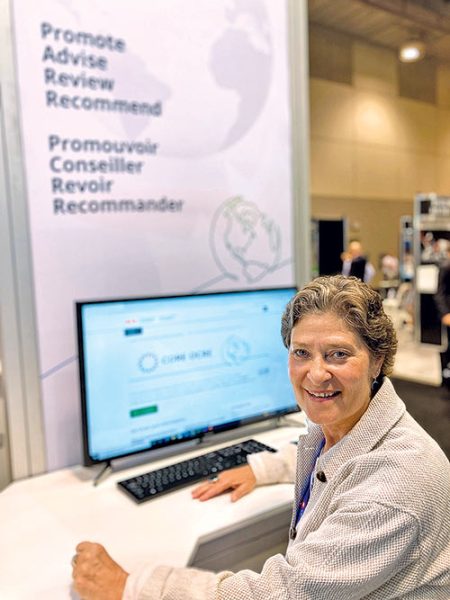We currently have three bills before our Parliament that seek to strengthen due diligence and ensure that human rights are respected throughout Canadian company supply chains. While the proposed legislation is important, Canada has not advanced as much as some other jurisdictions
The Canadian Ombudsperson for Responsible Enterprise (CORE) is a human rights ombuds institution with a mandate to promote respect for human rights and responsible business conduct among Canadian companies operating in the garment, mining and oil/gas sectors outside of Canada. The CORE is a world-first. There are no other offices of its kind, either elsewhere in Canada or around the world. This is how our interlocutor, Sheri Meyerhoffer, Canadian Ombudsperson for Responsible Enterprise, briefly summarizes the uniqueness of her institution.
“My office was established to address complaints related to human rights abuses committed by Canadian companies operating abroad in the garment, mining, and oil and gas sectors. It was created out of a commitment to ensure that Canadian companies respect human rights wherever they do business,” say Meyerhoffer, a Canadian lawyer with 17 years of experience in the upstream oil and gas industry, and 13 years of experience in international governance, rule of law and human rights.
“My mandate is composed of four main components: Promote, Advise, Review, and Recommend. First, the CORE promotes the implementation of the UN Guiding Principles on Business and Human Rights and the OECD Guidelines for Multinational Enterprises. Second, the CORE advises Canadian companies operating abroad in the garment, mining, and oil and gas sectors on best practices related to responsible business conduct. Third, the CORE reviews allegations of human rights abuses arising from Canadian companies’ operations abroad,” says Meyerhoffer, who’s worked in Bhutan, Bolivia, Cuba, China, India, Jamaica, Myanmar, Nepal, Russia, and the U.S.
“The CORE reviews allegations of human rights abuses through our complaints mechanism, through which impacted workers, individuals, and communities can submit complaints to the CORE,” adds our interlocutor.
Fourth, concludes Meyerhoffer, the CORE can issue recommendations to the concerned company or the Canadian government following the investigating of complaints and the completion of Ombuds reviews and studies: “These recommendations may be for compensation to remedy the harms caused, or changes to the policies and practices of Canadian companies.”
Why were the garment, mining, and oil and gas sectors in particular chosen; and how are specific sectors included or excluded from that list?
– The reason for the choice is historical. The CORE is the result of decades of advocacy by civil society organizations, and specifically in response to concern about harm to local populations. Canadian companies – particularly those in the garment, mining, and oil and gas industries – are very active abroad. For example, Canada is home to over half the world’s publicly listed mining and mineral exploration companies. The focus was originally on extractives. However, the Rana Plaza disaster in Bangladesh in 2013, and the fact that some large Canadian garment companies were implicated, led to the garment sector being included in the CORE’s mandate.
The CORE is a key pillar of the Canadian government’s new Responsible Business Conduct (RBC) strategy
While the majority of companies are committed to operating responsibly, human rights abuses may result from their operations. Canadian civil society organizations wanted the government to establish a body to monitor companies, provide a mechanism to resolve disputes, and provide remedies for those harmed.
There is a possibility that other sectors will be added to the CORE’s mandate, which we would welcome, assuming an expanded mandate comes with the resources needed for effective implementation.
The Canadian Government’s latest Responsible Business Conduct Strategy broadens its scope from the extractive industries to encompass all companies. What does that mean from the perspective of your intervention?
– The CORE is a key pillar of the Canadian government’s new Responsible Business Conduct (RBC) strategy. We welcome the new strategy’s expanded focus, and we remain committed to working with the Canadian government, Canada’s Trade Commissioner Service, and other Foreign Service personnel to promote human rights and RBC among Canadian companies operating abroad in the garment, mining and oil/gas sectors.
The European Union and certain European countries have been enacting legislative solutions that stipulate adherence to certain rights throughout global value chains. What is the Canadian response to these practices?
– The context in Canada is also starting to shift. We have seen, in recent years and even months, growing interest in, and discussion of, legislation that focuses on corporate accountability in Canada, including potential future legislation on human rights due diligence. Currently, we have three bills before our Parliament that seek to strengthen due diligence and ensure that human rights are respected throughout Canadian company supply chains.

While the proposed legislation is important, Canada is not currently as far along as other jurisdictions. Mandatory human rights due diligence legislation has already been enacted in France, Germany, Norway, and by the European Union. This is something that we would like to see happen in Canada, and we are encouraged by the strides being made. Most recently, this month (June 2022), the Canadian Minister of Labor, Seamus O’Regan, announced that the government would be supporting Bill S-211, the bill to enact the Fight Against Forced and Child Labor in Supply Chains Act. This act would impose an obligation on certain government institutions and private sector entities to report on measures taken to prevent and reduce the risk or forced labor or child labor being utilized by them or in their supply chains. It would also amend the Customs Tariff to allow for a prohibition on the importation of goods manufactured or produced, in whole or in part, through forced or child labor. We hope to see this bill strengthened, and passed by our government.
Other due diligence legislation currently before the Parliament includes Bill C-262, the Corporate Responsibility to Protect Human Rights Act. The act would require businesses to establish processes to prevent, address, and remedy adverse impacts on human rights that occur in relation to their business activities conducted abroad. It would also require businesses to monitor and document the implementation and effectiveness of their due diligence procedures.
How do you oversee the conduct of Canadian companies abroad, say in Serbia, for example?
– At the heart of CORE’s work is our complaints mechanism, through which impacted individuals and groups can submit complaints to the CORE regarding possible human rights abuses arising from the overseas operations of Canadian companies in our three sectors. If we were to receive a complaint from an impacted individual or community in Serbia, for example, the CORE would review this complaint and determine its admissibility according to our criteria. If admissible, the CORE would try to bring the complainant together with the Canadian company to seek early resolution. If that were not possible, we would bring in an external mediator, assuming both parties agreed. If mediation is not possible, then the CORE would launch a review or investigation, and once that is completed it would make recommendations to the company on how to remedy the harms caused, and possibly on changes to company policies. The CORE is required to publish its findings and recommendations, and monitor the extent to which they are implemented, which is an important means by which it can hold Canadian companies accountable.
Who can file a complaint with you? Workers themselves, unions, governments, NGOs?
– Complaints can be filed by or on behalf of an impacted individual, worker, community, or group. The mechanism for filing complaints is simple. Complaints can be submitted by email, by post, by phone and through our online complaints form, which is open to anyone around the world.
Human rights abuses can arise in a wide range of matters, including occupational health and safety, access to land, and employment practices
There is no cost for filing a complaint, and complainants do not need a lawyer to engage in the complaints process. We have sought to make it as easy as possible for impacted groups. That being said, we also recognize that impacted groups may face the threat of retaliation, which we take very seriously. The CORE assesses the risk of retaliation before working with people and communities, and works to avoid possible harm.
What kind of misconduct is the most commonplace; and how long does it take for you to establish the facts and reach a decision?
– We launched our complaint process just over a year ago, and have to date – as of time of writing – received five admissible complaints that are either awaiting follow-up or have been referred to Canada’s National Contact Point for the OECD Guidelines for Multinational Enterprises.

We recently received nine additional complaints related to the garment sector, which are currently under review. Once we receive a complaint, our office will assess the admissibility of a complaint within 30 working days and conduct an initial assessment within 90 working days. Our goal is to respond to complaints as soon as possible, while ensuring that we conduct thorough analysis and fact-finding.
For the purposes of a complaint, it is important to note that human rights include rights related to the environment, labor, health and safety. Our mandate covers all internationally recognized human rights. Under our mandate, a human rights abuse refers to an adverse impact on an internationally recognized human right arising from a Canadian company’s operations abroad. Human rights abuses can arise in a wide range of matters, including occupational health and safety, access to land, and employment practices like fair wages and reasonable working hours, sexual harassment, human trafficking and modern slavery.
What happens then? Where do your institution’s strengths lie?
– In addition to the tools of early resolution, mediation and investigation pursuant to a complaint, the CORE can conduct an Ombud-initiated review. This is a very powerful tool, as it allows me the discretion to launch a review when I receive information that would suggest that human rights abuses are taking place. We do not have to wait for a complaint, but can be proactive in determining that an operating context requires that we take action.
We also have the power to make recommendations to the Canadian government through the Minister of International Trade. These recommendations include the withdrawal of trade services and future financial support to the company in question, as well as recommendations on government policy regarding matters related to the CORE’s mandate.
Good Canadian companies understand the importance of acting responsibly. They know that there is no conflict between running a successful enterprise and respecting human rights. They know that it is good for business. As such, we expect Canadian companies to cooperate in our dispute resolution processes, and to work with the CORE to address harm arising from their operations. Having said that, if they do not cooperate, the CORE will proceed to make findings of fact and recommendations that will be set out in a report. My mandate requires the publication of these reports, thus making the company’s lack of engagement accessible to consumers and investors. This publication requirement provides a significant lever to influence responsible business conduct by Canadian companies in the garment, mining and oil and gas sectors.
| COMPLAINTS At the heart of CORE’s work is our complaints mechanism, through which impacted individuals and groups can submit complaints to the CORE | WISH Mandatory human rights due diligence legislation has already been enacted in the EU. This is something that we would like to see happen in Canada | RESPONSIBILITY Good Canadian companies understand the importance of acting responsibly. They know that there is no conflict between running a successful enterprise and respecting human rights |
|---|